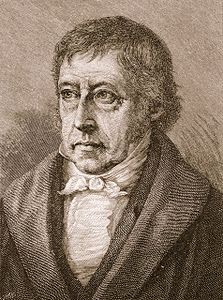What does Hegelianism mean?
Definitions for Hegelianism
heɪˈgeɪ li əˌnɪz əm, hɪ-hegelian·ism
This dictionary definitions page includes all the possible meanings, example usage and translations of the word Hegelianism.
Wikipedia
hegelianism
Georg Wilhelm Friedrich Hegel (; German: [ˈɡeːɔʁk ˈvɪlhɛlm ˈfʁiːdʁɪç ˈheːɡl̩]; 27 August 1770 – 14 November 1831) was a German philosopher. He is one of the most important figures in German idealism and one of the founding figures of modern Western philosophy. His influence extends across the entire range of contemporary philosophical topics, from metaphysical issues in epistemology and ontology, to political philosophy, the philosophy of history, philosophy of art, philosophy of religion, and the history of philosophy. Born in 1770 in Stuttgart during the transitional period between the Enlightenment and the Romantic movement in the Germanic regions of Europe, Hegel lived through and was influenced by the French Revolution and the Napoleonic wars. His fame rests chiefly upon The Phenomenology of Spirit, The Science of Logic, and his lectures at the University of Berlin on topics from his Encyclopedia of the Philosophical Sciences. Throughout his work, Hegel strove to address and correct the problematic dualisms of modern philosophy, Kantian and otherwise, typically by drawing upon the resources of ancient philosophy, particularly Aristotle. Hegel everywhere insists that reason and freedom are historical achievements, not natural givens. His dialectical-speculative procedure is grounded in the principle of immanence, that is, in assessing claims always according to their own internal criteria. Taking skepticism seriously, he contends that we cannot presume any truths that have not passed the test of experience. Guided by the Delphic imperative to "know thyself," Hegel presents free self-determination as the essence of humanity—a conclusion from his 1806-07 Phenomenology that he claims is further verified by the systematic account of the interdependence of logic, nature, and spirit in his later Encyclopedia. It is his claim that the Logic at once preserves and overcomes the dualisms of the material and the mental – that is, that it accounts for both the continuity and difference marking of the domains of nature and culture – as a metaphysically necessary and coherent "identity of identity and non-identity." Hegel's thought continues to exercise enormous influence – both positive and negative, direct and indirect – across a wide variety of traditions in Western philosophy.
Webster Dictionary
Hegelianismnoun
alt. of Hegelism
Wikidata
Hegelianism
Hegelianism is a collective term for schools of thought following or referring to G. W. F. Hegel's philosophy which can be summed up by the dictum that "the rational alone is real", which means that all reality is capable of being expressed in rational categories. His goal was to reduce reality to a more synthetic unity within the system of transcendental idealism.
Chambers 20th Century Dictionary
Hegelianism
hē-gē′li-an-izm, n. the philosophical principles of Wilhelm Friedrich Hegel (1770-1831).—adj. Hēgē′lian, of or pertaining to Hegel.—n. a follower of Hegel.
The Nuttall Encyclopedia
Hegelianism
the philosophy of Hegel, which resolves being into thought, and thought into the unity of the logical moments of simple apprehension, judgment, and reason, all purely spiritual acts, whereby being in itself, or seyn, becomes other than itself, or daseyn, and returns into itself, or für sich seyn, the universal being first by separating from itself particularised, and then by return into itself individualised, the whole being what Hegel characterises as Der Process des Geistes, "The Process of the Spirit." Something like this is what Dr. Stirling calls "The Secret of Hegel," and an open secret it is, for he finds it pervading the whole system; "open where you will in Hegel," he says, "you find him always engaged in saying pretty well the same thing"; always identity by otherness passing into selfness, or making that for itself which is at first in itself;—a philosophy which is anticipated by the doctrine of St. Paul, which represents God as the One from whom are all things as Father, and through whom are all things as Son, and to whom are all things as Spirit, the One who is thus All; it is also involved in the doctrine of Christ when He says God is Spirit, or the Living One who lives, and manifests Himself in life, for Himself, from Himself, and through Himself, who, so to say, thus concretes Himself throughout the universe.
Numerology
Chaldean Numerology
The numerical value of Hegelianism in Chaldean Numerology is: 9
Pythagorean Numerology
The numerical value of Hegelianism in Pythagorean Numerology is: 3
References
Translation
Find a translation for the Hegelianism definition in other languages:
Select another language:
- - Select -
- 简体中文 (Chinese - Simplified)
- 繁體中文 (Chinese - Traditional)
- Español (Spanish)
- Esperanto (Esperanto)
- 日本語 (Japanese)
- Português (Portuguese)
- Deutsch (German)
- العربية (Arabic)
- Français (French)
- Русский (Russian)
- ಕನ್ನಡ (Kannada)
- 한국어 (Korean)
- עברית (Hebrew)
- Gaeilge (Irish)
- Українська (Ukrainian)
- اردو (Urdu)
- Magyar (Hungarian)
- मानक हिन्दी (Hindi)
- Indonesia (Indonesian)
- Italiano (Italian)
- தமிழ் (Tamil)
- Türkçe (Turkish)
- తెలుగు (Telugu)
- ภาษาไทย (Thai)
- Tiếng Việt (Vietnamese)
- Čeština (Czech)
- Polski (Polish)
- Bahasa Indonesia (Indonesian)
- Românește (Romanian)
- Nederlands (Dutch)
- Ελληνικά (Greek)
- Latinum (Latin)
- Svenska (Swedish)
- Dansk (Danish)
- Suomi (Finnish)
- فارسی (Persian)
- ייִדיש (Yiddish)
- հայերեն (Armenian)
- Norsk (Norwegian)
- English (English)
Word of the Day
Would you like us to send you a FREE new word definition delivered to your inbox daily?
Citation
Use the citation below to add this definition to your bibliography:
Style:MLAChicagoAPA
"Hegelianism." Definitions.net. STANDS4 LLC, 2024. Web. 23 Apr. 2024. <https://www.definitions.net/definition/Hegelianism>.



Discuss these Hegelianism definitions with the community:
Report Comment
We're doing our best to make sure our content is useful, accurate and safe.
If by any chance you spot an inappropriate comment while navigating through our website please use this form to let us know, and we'll take care of it shortly.
Attachment
You need to be logged in to favorite.
Log In